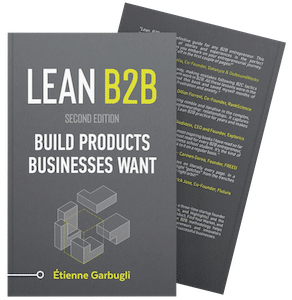There are clear benefits to targeting the enterprise market.
In the enterprise market, a startup may be competing against fewer companies, they may be able to reach profitability more quickly (thanks to greater deal sizes), and ultimately, should they become a market leader, new entrants will find it difficult to compete against them.
The value of going enterprise first can partly be explained by Christopher Janz‘s Five Ways to Build a $100 Million Business:

A startup that targets whales or elephants at first would need significantly fewer customers to reach profitability. But, does that make it a good strategy early on?
Early-Stage Startups and the Enterprise Market
In the early stages, you’ll be starting with assumptions. To be able to make progress and validate your business model, you’ll need frequent access to prospective customers. In certain segments of the enterprise, this will be a real challenge.
Whereas, if you were to target SMBs, or other segments of smaller organizations, the markets would generally have more companies to sell to, and the organizations within them would have stakeholders that are more aligned on priorities (with fewer people to convince).
This, in part, explains why the average sales cycle in the enterprise is roughly four times the length of the average sales cycle selling to small businesses (6 months vs 45 days).
Shorter sales cycles means that you can test more product/market hypotheses faster, get more feedback, and iterate more quickly.
This means you are giving yourself more bites at the apple, and more chances to recover if things aren’t headed in the right direction. The impact that this can have on your ability to reach product/market fit should not be understated.
You’ll also generally need fewer features to build the whole product, and you’ll be in a better position to expand into the enterprise later than had you done the reverse.
Consider selling to small businesses first. Once your company has been established, you’ll be in a stronger position to expand and pursue the enterprise market.
If you do decide to go after the enterprise, the key thing will be to avoid getting caught by surprise. Build your pipeline, extend your runway, and engineer momentum to keep your team involved and committed; the initial sales cycles will be long, and may prove extremely challenging.
More on Enterprise Startups
- Enterprises vs SMBs: Who’s the Better Customer for B2B Startups?
- [ Interview ] Testlio Co-Founder Kristel Kruustük on Creating an Enterprise Marketplace for Software Testing
- How Cobrainer Used Consulting to Bootstrap and Validate an Enterprise Product
Download the First 4 Chapters Free
Learn the major differences between B2B and B2C customer development, how to think about business ideas, and how to assess a venture’s risk in this 70-page sampler.
Working on a B2B Startup?
Join our free email course to learn all you need to know:


